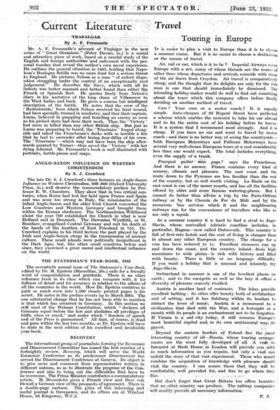Current Literature
—TRAFALGAR - By A- F. Fremantle
Mr. A. F. Freniantle's account of Trafalgar in the new series of " Great Occasions " (Peter Davies, 5s.) is a 'sound and attractive piece of work, based on a careful study of the English and foreign authorities 'and enlivened with the per- sonal touches that reveal the author's own naval experience. He outlines the general situation in 1805, holding that Napo- leon's Boulogne flotilla was no mere feint but a serious threat to England. He pictures Nelson as a man " of ardent dispo- sition struggling under the control of an exceptionally cool judgement' He He describes the Navy, which with all its defects was better manned and better found than either the French or Spanish fleet. He quotes freely from Nelson's diary in his narrative of the long chase of Villeneuve to the West Indies and back. He gives a concise but intelligent description of the battle. He notes that the crew of the ' Redoubtable,' from which Nelson received his fatal wound, had been specially trained in musketry, and that their captain, Lucas, believed in grappling and boarding an enemy as soon as his picked shots had done their work, Thus the Victory ' lost more in killed than any other British ship. But just as Lucas was preparing to board, the Temeraire ' forged along- side and raked the Frenchman's decks with so terrible a fire that he had to surrender after losing four-fifths of his crew. The Temeraire '—which may not have been the ship after- wards painted by Turner—thus saved the ' Victory' with her dying Admiral. Mr. Fremantle's book is well illustrated with portraits, battle-pieces and maps.








































 Previous page
Previous page